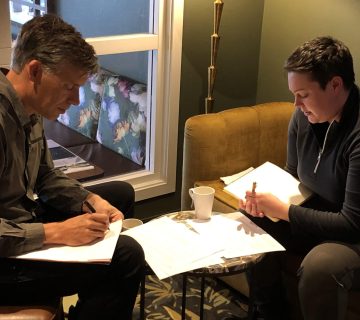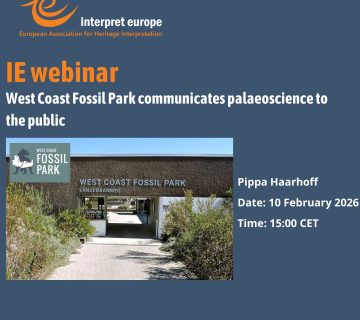Through important topics, inspired discussion and constructive conclusions, an Interpret Europe Action Plan for the Western Balkans was developed. This plan, which reinforces IE initiatives, was developed at the Western Balkans Country Coordinator meeting held in Novi Sad on 18 November.
This event was extraordinary and reflected the ambience of the Pavle Beljanski Memorial Collection, where it took place. The paintings and sculptures created by 20th Century Serbian artists provided an inspiring backdrop and stimulated this opportunity to share experience and ideas and find the best solutions for the region.
The meeting was attended by Thorsten Ludwig (Managing Director), Helena Vičič (Management Assistant), Valya Stergioti (Training Coordinator), and IE Country Coordinators from the Western Balkans: Dragana Lucija Ratković Aydemir (Croatia), Janja Sivec (Slovenia), Gordana Milanović (Serbia), Nada Andonovska (Macedonia), Dorina Xherai-Subashi (Albania) and Bojana Sekulić (Montenegro).
Through a SWOT analysis, we explored the big picture of the situation in the Interpret Europe Western Balkans (IE WB) network and used the technique to recognise ways of reinforcing it. We identified the major strength of the Western Balkans as its authenticity that is appreciated by its visitors, but could this overcome the most significant weakness that the locals are not involved in heritage interpretation as they should be?
Furthermore, using opportunities such as heritage interpretation’s power to adapt to the growing tourism market niches, the EU priorities and potential funds for the WB, locals will benefit from an intense cross-border experience exchange and high-quality job opportunities especially in sustainable tourism. Using the Western Balkan’s authenticity and diversity as a base and by involving citizens in heritage interpretation in an engaged and inclusive way, while creating synergies with all stakeholders, we will achieve the goal – to strengthen the IE network.
Bearing in mind the IE vision, at this innovative meeting we developed the IE WB action plan. Its primary goal is the growth of the IE network using the WB’s strengths – examples of good practice that we should pursue in our IE initiatives. The key part of the plan’s first phase is the preparation of a WB case studies catalogue. This collection can be presented at an EU level and more locally to companies with corporate social responsibility policies. Country coordinators will develop this catalogue by collecting good examples of initiatives that meet pre-defined quality criteria for both heritage interpretation projects and Europe’s shared values.
This presentation will be a great chance to show that, even within the delicate historical circumstances of the WB, there is a compelling case for strengthening the IE network. The IE Conference 2019 in Sarajevo will be one more confirmation of that. The presence of this EU level work will make the last phase of the plan easier. This final phase will see country coordinators acting locally and strengthening the IE network through finding organised partners for the IE courses, running those courses based upon the input of experts from all over Europe and gaining new members.
This multidimensional approach makes the IE action plan a useful tool that contributes to the achievement of the IE goals in the WB making this small area an example of best practice.
Bojana Sekulić is the IE Country Coordinator Montenegro. As a heritage lover, she works as a hiking guide helping visitors get closer to heritage and motivating locals to use it sustainably. She can be contacted at bojana.sekulic@interpret-europe.net.
To cite this article:
Sekulić, Bojana (2018) ‘Western Balkans regional meeting ‘. In Interpret Europe Newsletter 4-2018, 26.
Available online:
www.interpret-europe.net/fileadmin/Documents/publications/Newsletters/ie-newsletter_2018-4_winter.pdf




